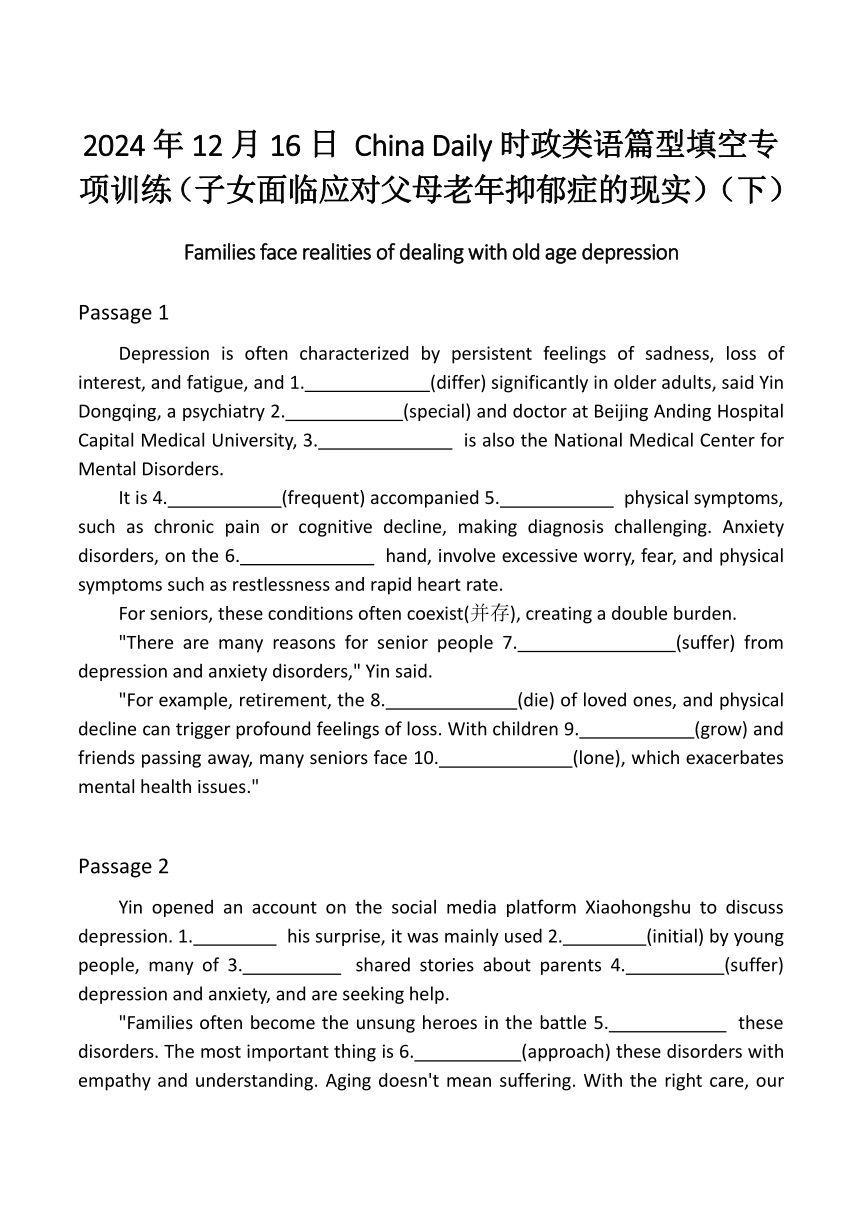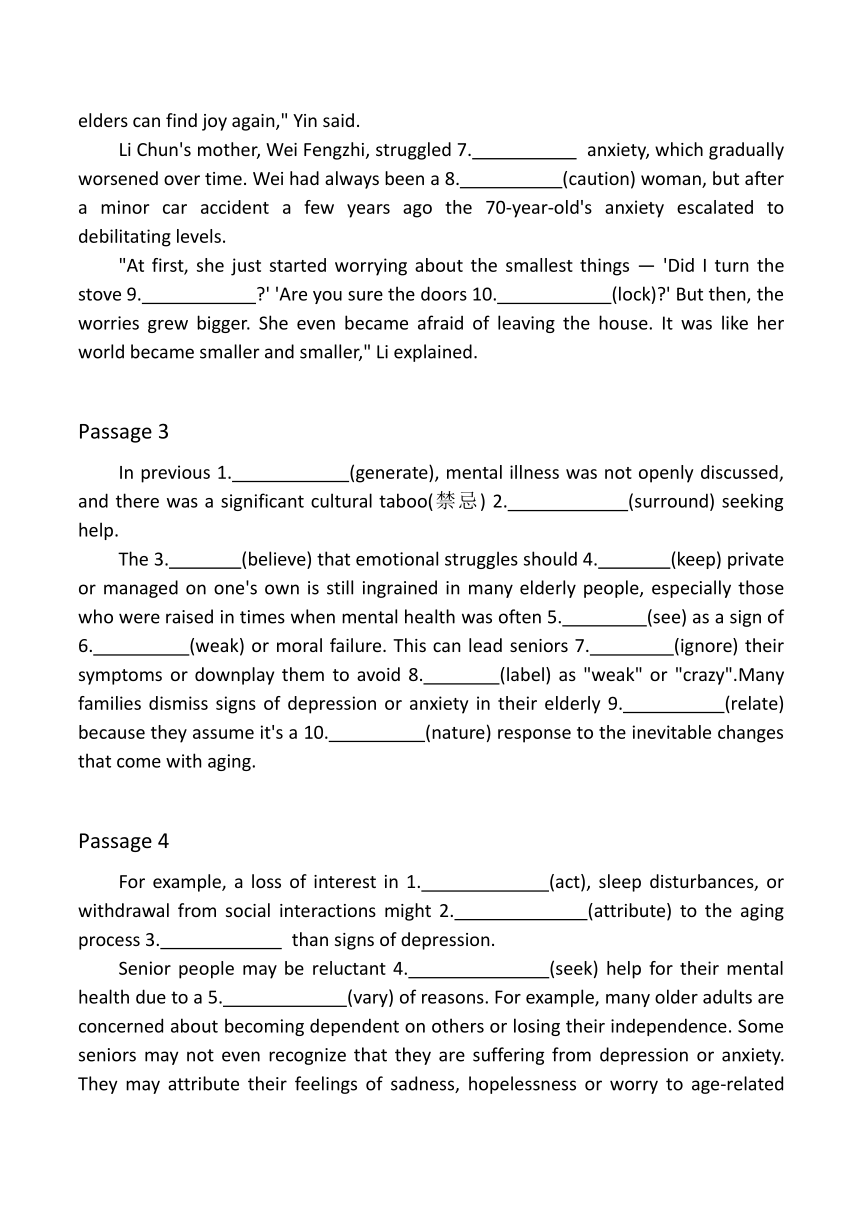2025届高三英语上学期一轮复习专项:2024年12月16日 China Daily时政类语篇型填空专项训练(子女面临应对父母老年抑郁症的现实)(下)(含答案)
文档属性
| 名称 | 2025届高三英语上学期一轮复习专项:2024年12月16日 China Daily时政类语篇型填空专项训练(子女面临应对父母老年抑郁症的现实)(下)(含答案) |  | |
| 格式 | docx | ||
| 文件大小 | 28.2KB | ||
| 资源类型 | 教案 | ||
| 版本资源 | 人教版(2019) | ||
| 科目 | 英语 | ||
| 更新时间 | 2024-12-21 14:30:49 | ||
图片预览


文档简介
2024年12月16日 China Daily时政类语篇型填空专项训练(子女面临应对父母老年抑郁症的现实)(下)
Families face realities of dealing with old age depression
Passage 1
Depression is often characterized by persistent feelings of sadness, loss of interest, and fatigue, and 1. (differ) significantly in older adults, said Yin Dongqing, a psychiatry 2. (special) and doctor at Beijing Anding Hospital Capital Medical University, 3. is also the National Medical Center for Mental Disorders.
It is 4. (frequent) accompanied 5. physical symptoms, such as chronic pain or cognitive decline, making diagnosis challenging. Anxiety disorders, on the 6. hand, involve excessive worry, fear, and physical symptoms such as restlessness and rapid heart rate.
For seniors, these conditions often coexist(并存), creating a double burden.
"There are many reasons for senior people 7. (suffer) from depression and anxiety disorders," Yin said.
"For example, retirement, the 8. (die) of loved ones, and physical decline can trigger profound feelings of loss. With children 9. (grow) and friends passing away, many seniors face 10. (lone), which exacerbates mental health issues."
Passage 2
Yin opened an account on the social media platform Xiaohongshu to discuss depression. 1. his surprise, it was mainly used 2. (initial) by young people, many of 3. shared stories about parents 4. (suffer) depression and anxiety, and are seeking help.
"Families often become the unsung heroes in the battle 5. these disorders. The most important thing is 6. (approach) these disorders with empathy and understanding. Aging doesn't mean suffering. With the right care, our elders can find joy again," Yin said.
Li Chun's mother, Wei Fengzhi, struggled 7. anxiety, which gradually worsened over time. Wei had always been a 8. (caution) woman, but after a minor car accident a few years ago the 70-year-old's anxiety escalated to debilitating levels.
"At first, she just started worrying about the smallest things — 'Did I turn the stove 9. ' 'Are you sure the doors 10. (lock) ' But then, the worries grew bigger. She even became afraid of leaving the house. It was like her world became smaller and smaller," Li explained.
Passage 3
In previous 1. (generate), mental illness was not openly discussed, and there was a significant cultural taboo(禁忌) 2. (surround) seeking help.
The 3. (believe) that emotional struggles should 4. (keep) private or managed on one's own is still ingrained in many elderly people, especially those who were raised in times when mental health was often 5. (see) as a sign of 6. (weak) or moral failure. This can lead seniors 7. (ignore) their symptoms or downplay them to avoid 8. (label) as "weak" or "crazy".Many families dismiss signs of depression or anxiety in their elderly 9. (relate) because they assume it's a 10. (nature) response to the inevitable changes that come with aging.
Passage 4
For example, a loss of interest in 1. (act), sleep disturbances, or withdrawal from social interactions might 2. (attribute) to the aging process 3. than signs of depression.
Senior people may be reluctant 4. (seek) help for their mental health due to a 5. (vary) of reasons. For example, many older adults are concerned about becoming dependent on others or losing their independence. Some seniors may not even recognize that they are suffering from depression or anxiety. They may attribute their feelings of sadness, hopelessness or worry to age-related issues, or, assume that such feelings are unavoidable.
This lack of 6. (aware) can prevent them 7. seeking treatment.With the right treatment, understanding and support not only from the families but also from the 8. (social), these conditions can be managed, and 9. (recover) is possible. Only then 10. seniors face the future with the hope and dignity they deserve."
参考答案
参考答案1
1.differs 2.specialist 3.which 4.frequently 5.by
6.other 7.to suffer 8.death 9.grown 10.loneliness
参考译文1
首都医科大学附属北京安定医院的精神病学专家、医生尹冬青说,抑郁症通常以持续的悲伤感、失去兴趣和疲劳为特征,这在老年人身上有很大不同。首都医科大学附属北京安定医院也是国家精神疾病医学中心。
它经常伴随着身体症状,如慢性疼痛或认知能力下降,使诊断具有挑战性。另一方面,焦虑症包括过度担心、恐惧和身体症状,如不安和心率加快。
对于老年人来说,这些条件往往并存,造成双重负担。
“老年人患有抑郁症和焦虑症的原因有很多,”尹教授说。
“例如,退休、亲人去世和身体衰退都会引发深刻的失落感。随着孩子的长大和朋友的去世,许多老年人面临孤独,这加剧了心理健康问题。”
参考答案2
1.To 2.initially 3.whom 4.suffering 5.against
6.to approach 7.with 8.cautious 9.off 10.are locked
参考译文2
尹在社交媒体平台小红书上开了一个账号来讨论抑郁症。令他惊讶的是,最初主要由年轻人使用,其中许多人分享了父母遭受抑郁和焦虑的故事,并正在寻求帮助。
“在与这些疾病的斗争中,家庭往往成为无名英雄。最重要的是用同理心和理解来对待这些障碍。变老并不意味着受苦。有了正确的照顾,我们的长辈可以重新找到快乐。”
李春的母亲魏凤芝一直在焦虑中挣扎,随着时间的推移,焦虑逐渐恶化。魏一直是一个谨慎的女人,但在几年前的一场小车祸之后,这位70岁的老人的焦虑升级到了令人虚弱的程度。
“起初,她只是开始担心一些最小的事情——‘我把炉子关了吗?“你肯定门都锁上了吗?”但随后,担忧越来越大。她甚至害怕离开家。就好像她的世界变得越来越小。”
参考答案3
1.generations 2.surrounding 3.belief 4.be kept 5.seen
6.weakness 7.to ignore 8.being labeled 9.relatives 10.natural
参考译文3
在前几代人当中,精神疾病是不会被公开讨论的,而且在寻求帮助方面也存在着重大的文化禁忌。
许多老年人仍然根深蒂固地认为,情感斗争应该是私人的或自己处理的,尤其是那些在心理健康经常被视为软弱或道德失败的标志的时代长大的人。这可能导致老年人忽视或淡化他们的症状,以避免被贴上“虚弱”或“疯狂”的标签。
许多家庭对老年亲属出现抑郁或焦虑的迹象不以为然,因为他们认为这是对衰老带来的不可避免的变化的自然反应。
参考答案4
1.activities 2.be attributed 3.rather 4.to seek 5.variety
6.awareness 7.from 8.society 9.recovery 10.can
参考译文4
例如,对活动失去兴趣、睡眠障碍或退出社会交往可能归因于衰老过程,而不是抑郁症的迹象。
由于各种原因,老年人可能不愿意寻求心理健康方面的帮助。例如,许多老年人担心变得依赖他人或失去独立性。一些老年人甚至没有意识到他们患有抑郁症或焦虑症。他们可能把自己的悲伤、绝望或担忧的感觉归因于与年龄有关的问题,或者认为这些感觉是不可避免的。
这种意识的缺乏会阻止他们寻求治疗。有了正确的治疗,家庭和社会的理解和支持,这些情况可以得到控制,康复是可能的。只有这样,老年人才能带着应有的希望和尊严面对未来。
Families face realities of dealing with old age depression
Passage 1
Depression is often characterized by persistent feelings of sadness, loss of interest, and fatigue, and 1. (differ) significantly in older adults, said Yin Dongqing, a psychiatry 2. (special) and doctor at Beijing Anding Hospital Capital Medical University, 3. is also the National Medical Center for Mental Disorders.
It is 4. (frequent) accompanied 5. physical symptoms, such as chronic pain or cognitive decline, making diagnosis challenging. Anxiety disorders, on the 6. hand, involve excessive worry, fear, and physical symptoms such as restlessness and rapid heart rate.
For seniors, these conditions often coexist(并存), creating a double burden.
"There are many reasons for senior people 7. (suffer) from depression and anxiety disorders," Yin said.
"For example, retirement, the 8. (die) of loved ones, and physical decline can trigger profound feelings of loss. With children 9. (grow) and friends passing away, many seniors face 10. (lone), which exacerbates mental health issues."
Passage 2
Yin opened an account on the social media platform Xiaohongshu to discuss depression. 1. his surprise, it was mainly used 2. (initial) by young people, many of 3. shared stories about parents 4. (suffer) depression and anxiety, and are seeking help.
"Families often become the unsung heroes in the battle 5. these disorders. The most important thing is 6. (approach) these disorders with empathy and understanding. Aging doesn't mean suffering. With the right care, our elders can find joy again," Yin said.
Li Chun's mother, Wei Fengzhi, struggled 7. anxiety, which gradually worsened over time. Wei had always been a 8. (caution) woman, but after a minor car accident a few years ago the 70-year-old's anxiety escalated to debilitating levels.
"At first, she just started worrying about the smallest things — 'Did I turn the stove 9. ' 'Are you sure the doors 10. (lock) ' But then, the worries grew bigger. She even became afraid of leaving the house. It was like her world became smaller and smaller," Li explained.
Passage 3
In previous 1. (generate), mental illness was not openly discussed, and there was a significant cultural taboo(禁忌) 2. (surround) seeking help.
The 3. (believe) that emotional struggles should 4. (keep) private or managed on one's own is still ingrained in many elderly people, especially those who were raised in times when mental health was often 5. (see) as a sign of 6. (weak) or moral failure. This can lead seniors 7. (ignore) their symptoms or downplay them to avoid 8. (label) as "weak" or "crazy".Many families dismiss signs of depression or anxiety in their elderly 9. (relate) because they assume it's a 10. (nature) response to the inevitable changes that come with aging.
Passage 4
For example, a loss of interest in 1. (act), sleep disturbances, or withdrawal from social interactions might 2. (attribute) to the aging process 3. than signs of depression.
Senior people may be reluctant 4. (seek) help for their mental health due to a 5. (vary) of reasons. For example, many older adults are concerned about becoming dependent on others or losing their independence. Some seniors may not even recognize that they are suffering from depression or anxiety. They may attribute their feelings of sadness, hopelessness or worry to age-related issues, or, assume that such feelings are unavoidable.
This lack of 6. (aware) can prevent them 7. seeking treatment.With the right treatment, understanding and support not only from the families but also from the 8. (social), these conditions can be managed, and 9. (recover) is possible. Only then 10. seniors face the future with the hope and dignity they deserve."
参考答案
参考答案1
1.differs 2.specialist 3.which 4.frequently 5.by
6.other 7.to suffer 8.death 9.grown 10.loneliness
参考译文1
首都医科大学附属北京安定医院的精神病学专家、医生尹冬青说,抑郁症通常以持续的悲伤感、失去兴趣和疲劳为特征,这在老年人身上有很大不同。首都医科大学附属北京安定医院也是国家精神疾病医学中心。
它经常伴随着身体症状,如慢性疼痛或认知能力下降,使诊断具有挑战性。另一方面,焦虑症包括过度担心、恐惧和身体症状,如不安和心率加快。
对于老年人来说,这些条件往往并存,造成双重负担。
“老年人患有抑郁症和焦虑症的原因有很多,”尹教授说。
“例如,退休、亲人去世和身体衰退都会引发深刻的失落感。随着孩子的长大和朋友的去世,许多老年人面临孤独,这加剧了心理健康问题。”
参考答案2
1.To 2.initially 3.whom 4.suffering 5.against
6.to approach 7.with 8.cautious 9.off 10.are locked
参考译文2
尹在社交媒体平台小红书上开了一个账号来讨论抑郁症。令他惊讶的是,最初主要由年轻人使用,其中许多人分享了父母遭受抑郁和焦虑的故事,并正在寻求帮助。
“在与这些疾病的斗争中,家庭往往成为无名英雄。最重要的是用同理心和理解来对待这些障碍。变老并不意味着受苦。有了正确的照顾,我们的长辈可以重新找到快乐。”
李春的母亲魏凤芝一直在焦虑中挣扎,随着时间的推移,焦虑逐渐恶化。魏一直是一个谨慎的女人,但在几年前的一场小车祸之后,这位70岁的老人的焦虑升级到了令人虚弱的程度。
“起初,她只是开始担心一些最小的事情——‘我把炉子关了吗?“你肯定门都锁上了吗?”但随后,担忧越来越大。她甚至害怕离开家。就好像她的世界变得越来越小。”
参考答案3
1.generations 2.surrounding 3.belief 4.be kept 5.seen
6.weakness 7.to ignore 8.being labeled 9.relatives 10.natural
参考译文3
在前几代人当中,精神疾病是不会被公开讨论的,而且在寻求帮助方面也存在着重大的文化禁忌。
许多老年人仍然根深蒂固地认为,情感斗争应该是私人的或自己处理的,尤其是那些在心理健康经常被视为软弱或道德失败的标志的时代长大的人。这可能导致老年人忽视或淡化他们的症状,以避免被贴上“虚弱”或“疯狂”的标签。
许多家庭对老年亲属出现抑郁或焦虑的迹象不以为然,因为他们认为这是对衰老带来的不可避免的变化的自然反应。
参考答案4
1.activities 2.be attributed 3.rather 4.to seek 5.variety
6.awareness 7.from 8.society 9.recovery 10.can
参考译文4
例如,对活动失去兴趣、睡眠障碍或退出社会交往可能归因于衰老过程,而不是抑郁症的迹象。
由于各种原因,老年人可能不愿意寻求心理健康方面的帮助。例如,许多老年人担心变得依赖他人或失去独立性。一些老年人甚至没有意识到他们患有抑郁症或焦虑症。他们可能把自己的悲伤、绝望或担忧的感觉归因于与年龄有关的问题,或者认为这些感觉是不可避免的。
这种意识的缺乏会阻止他们寻求治疗。有了正确的治疗,家庭和社会的理解和支持,这些情况可以得到控制,康复是可能的。只有这样,老年人才能带着应有的希望和尊严面对未来。
